History of Psychology Blog Posts: Assignment on Key Figures and Events
VerifiedAdded on 2023/01/20
|6
|1886
|25
Homework Assignment
AI Summary
This assignment comprises three blog posts, each approximately 500 words, delving into pivotal moments in the history of psychology. The first post examines B.F. Skinner, a prominent figure known for his contributions to behaviorism, operant conditioning, and the concept of reinforcement. It contrasts his radical behaviorism with other schools of thought and highlights his experimental approach. The second post focuses on functional psychology, tracing its roots in Darwinian ideology and its contrast with structuralism. It discusses the movement's emphasis on the purpose of behavior and its impact on applied psychology. The final post analyzes the publication of DSM-II, the Diagnostic and Statistical Manual of Mental Disorders, and its significance in standardizing the classification and treatment of mental illnesses. It explores its impact on clinical practice and research, contrasting it with earlier diagnostic systems and highlighting its evolution.
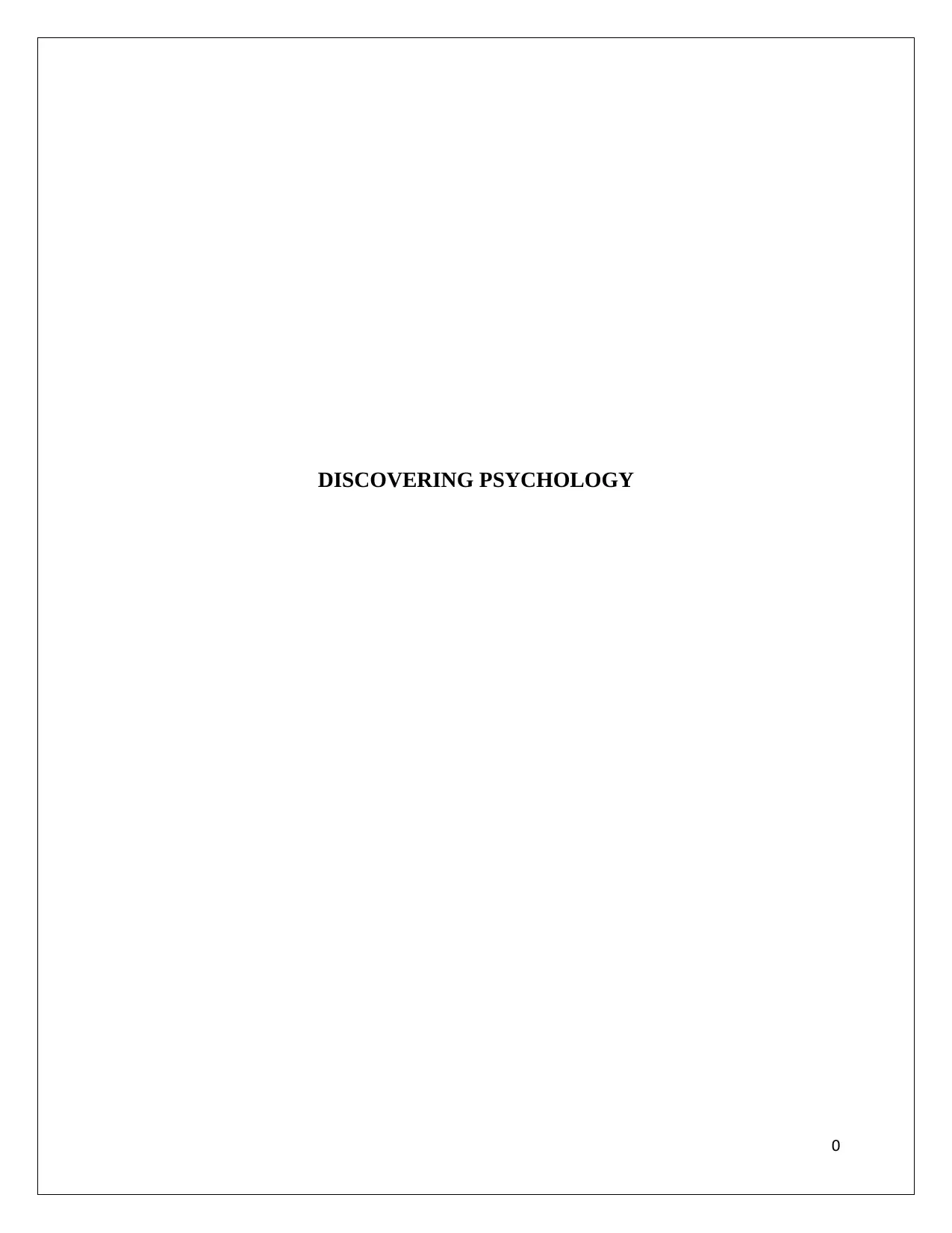
DISCOVERING PSYCHOLOGY
0
0
Paraphrase This Document
Need a fresh take? Get an instant paraphrase of this document with our AI Paraphraser
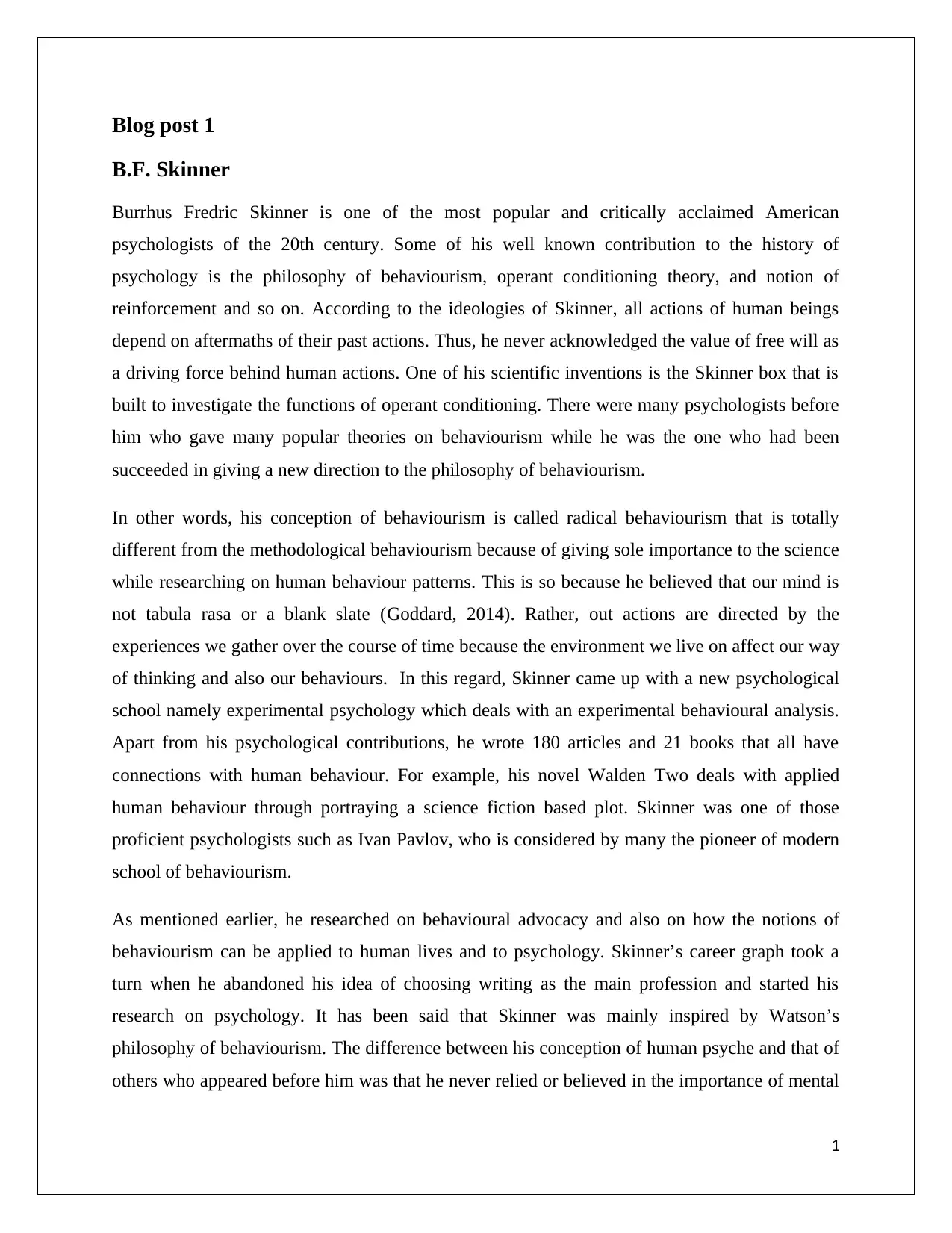
Blog post 1
B.F. Skinner
Burrhus Fredric Skinner is one of the most popular and critically acclaimed American
psychologists of the 20th century. Some of his well known contribution to the history of
psychology is the philosophy of behaviourism, operant conditioning theory, and notion of
reinforcement and so on. According to the ideologies of Skinner, all actions of human beings
depend on aftermaths of their past actions. Thus, he never acknowledged the value of free will as
a driving force behind human actions. One of his scientific inventions is the Skinner box that is
built to investigate the functions of operant conditioning. There were many psychologists before
him who gave many popular theories on behaviourism while he was the one who had been
succeeded in giving a new direction to the philosophy of behaviourism.
In other words, his conception of behaviourism is called radical behaviourism that is totally
different from the methodological behaviourism because of giving sole importance to the science
while researching on human behaviour patterns. This is so because he believed that our mind is
not tabula rasa or a blank slate (Goddard, 2014). Rather, out actions are directed by the
experiences we gather over the course of time because the environment we live on affect our way
of thinking and also our behaviours. In this regard, Skinner came up with a new psychological
school namely experimental psychology which deals with an experimental behavioural analysis.
Apart from his psychological contributions, he wrote 180 articles and 21 books that all have
connections with human behaviour. For example, his novel Walden Two deals with applied
human behaviour through portraying a science fiction based plot. Skinner was one of those
proficient psychologists such as Ivan Pavlov, who is considered by many the pioneer of modern
school of behaviourism.
As mentioned earlier, he researched on behavioural advocacy and also on how the notions of
behaviourism can be applied to human lives and to psychology. Skinner’s career graph took a
turn when he abandoned his idea of choosing writing as the main profession and started his
research on psychology. It has been said that Skinner was mainly inspired by Watson’s
philosophy of behaviourism. The difference between his conception of human psyche and that of
others who appeared before him was that he never relied or believed in the importance of mental
1
B.F. Skinner
Burrhus Fredric Skinner is one of the most popular and critically acclaimed American
psychologists of the 20th century. Some of his well known contribution to the history of
psychology is the philosophy of behaviourism, operant conditioning theory, and notion of
reinforcement and so on. According to the ideologies of Skinner, all actions of human beings
depend on aftermaths of their past actions. Thus, he never acknowledged the value of free will as
a driving force behind human actions. One of his scientific inventions is the Skinner box that is
built to investigate the functions of operant conditioning. There were many psychologists before
him who gave many popular theories on behaviourism while he was the one who had been
succeeded in giving a new direction to the philosophy of behaviourism.
In other words, his conception of behaviourism is called radical behaviourism that is totally
different from the methodological behaviourism because of giving sole importance to the science
while researching on human behaviour patterns. This is so because he believed that our mind is
not tabula rasa or a blank slate (Goddard, 2014). Rather, out actions are directed by the
experiences we gather over the course of time because the environment we live on affect our way
of thinking and also our behaviours. In this regard, Skinner came up with a new psychological
school namely experimental psychology which deals with an experimental behavioural analysis.
Apart from his psychological contributions, he wrote 180 articles and 21 books that all have
connections with human behaviour. For example, his novel Walden Two deals with applied
human behaviour through portraying a science fiction based plot. Skinner was one of those
proficient psychologists such as Ivan Pavlov, who is considered by many the pioneer of modern
school of behaviourism.
As mentioned earlier, he researched on behavioural advocacy and also on how the notions of
behaviourism can be applied to human lives and to psychology. Skinner’s career graph took a
turn when he abandoned his idea of choosing writing as the main profession and started his
research on psychology. It has been said that Skinner was mainly inspired by Watson’s
philosophy of behaviourism. The difference between his conception of human psyche and that of
others who appeared before him was that he never relied or believed in the importance of mental
1
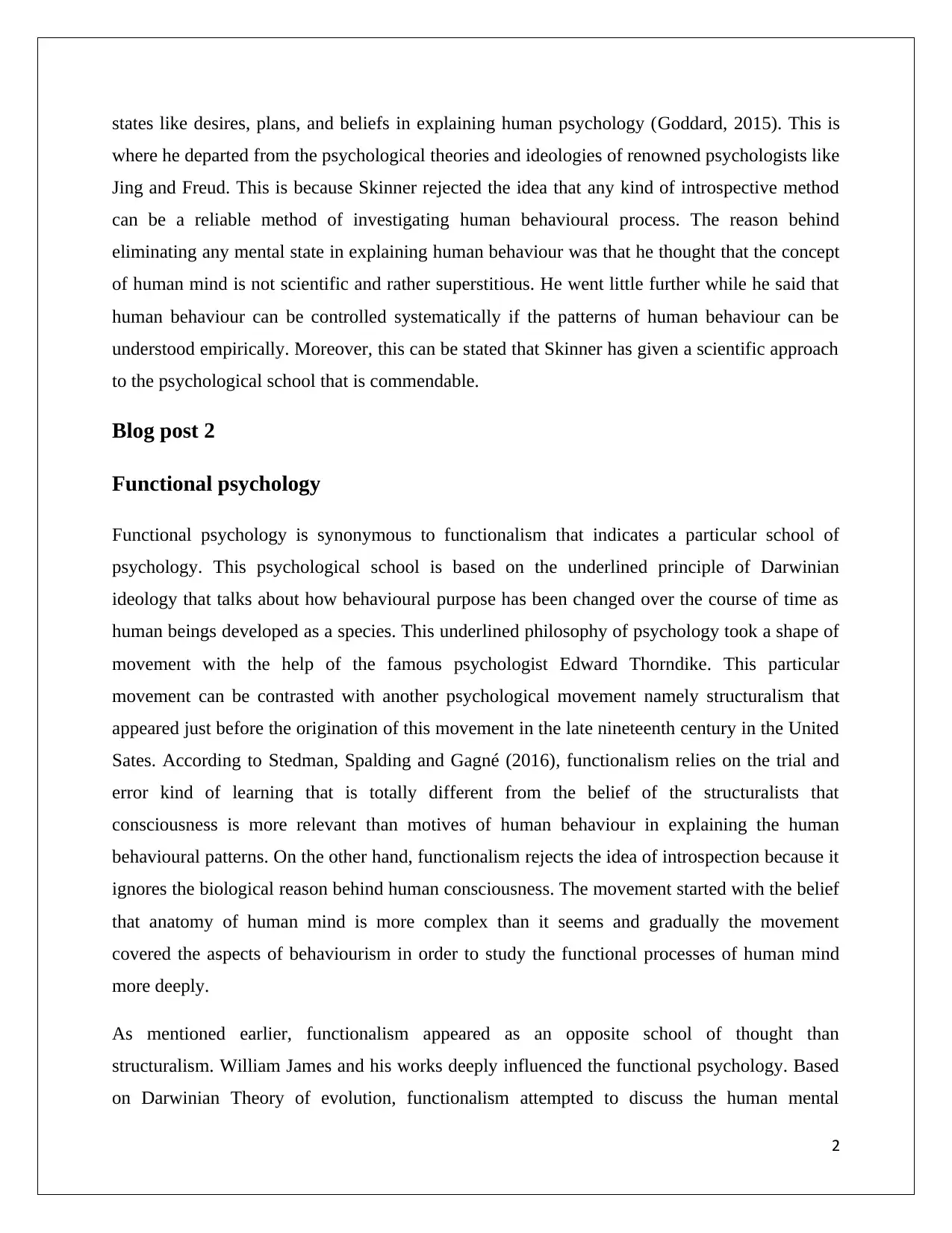
states like desires, plans, and beliefs in explaining human psychology (Goddard, 2015). This is
where he departed from the psychological theories and ideologies of renowned psychologists like
Jing and Freud. This is because Skinner rejected the idea that any kind of introspective method
can be a reliable method of investigating human behavioural process. The reason behind
eliminating any mental state in explaining human behaviour was that he thought that the concept
of human mind is not scientific and rather superstitious. He went little further while he said that
human behaviour can be controlled systematically if the patterns of human behaviour can be
understood empirically. Moreover, this can be stated that Skinner has given a scientific approach
to the psychological school that is commendable.
Blog post 2
Functional psychology
Functional psychology is synonymous to functionalism that indicates a particular school of
psychology. This psychological school is based on the underlined principle of Darwinian
ideology that talks about how behavioural purpose has been changed over the course of time as
human beings developed as a species. This underlined philosophy of psychology took a shape of
movement with the help of the famous psychologist Edward Thorndike. This particular
movement can be contrasted with another psychological movement namely structuralism that
appeared just before the origination of this movement in the late nineteenth century in the United
Sates. According to Stedman, Spalding and Gagné (2016), functionalism relies on the trial and
error kind of learning that is totally different from the belief of the structuralists that
consciousness is more relevant than motives of human behaviour in explaining the human
behavioural patterns. On the other hand, functionalism rejects the idea of introspection because it
ignores the biological reason behind human consciousness. The movement started with the belief
that anatomy of human mind is more complex than it seems and gradually the movement
covered the aspects of behaviourism in order to study the functional processes of human mind
more deeply.
As mentioned earlier, functionalism appeared as an opposite school of thought than
structuralism. William James and his works deeply influenced the functional psychology. Based
on Darwinian Theory of evolution, functionalism attempted to discuss the human mental
2
where he departed from the psychological theories and ideologies of renowned psychologists like
Jing and Freud. This is because Skinner rejected the idea that any kind of introspective method
can be a reliable method of investigating human behavioural process. The reason behind
eliminating any mental state in explaining human behaviour was that he thought that the concept
of human mind is not scientific and rather superstitious. He went little further while he said that
human behaviour can be controlled systematically if the patterns of human behaviour can be
understood empirically. Moreover, this can be stated that Skinner has given a scientific approach
to the psychological school that is commendable.
Blog post 2
Functional psychology
Functional psychology is synonymous to functionalism that indicates a particular school of
psychology. This psychological school is based on the underlined principle of Darwinian
ideology that talks about how behavioural purpose has been changed over the course of time as
human beings developed as a species. This underlined philosophy of psychology took a shape of
movement with the help of the famous psychologist Edward Thorndike. This particular
movement can be contrasted with another psychological movement namely structuralism that
appeared just before the origination of this movement in the late nineteenth century in the United
Sates. According to Stedman, Spalding and Gagné (2016), functionalism relies on the trial and
error kind of learning that is totally different from the belief of the structuralists that
consciousness is more relevant than motives of human behaviour in explaining the human
behavioural patterns. On the other hand, functionalism rejects the idea of introspection because it
ignores the biological reason behind human consciousness. The movement started with the belief
that anatomy of human mind is more complex than it seems and gradually the movement
covered the aspects of behaviourism in order to study the functional processes of human mind
more deeply.
As mentioned earlier, functionalism appeared as an opposite school of thought than
structuralism. William James and his works deeply influenced the functional psychology. Based
on Darwinian Theory of evolution, functionalism attempted to discuss the human mental
2
⊘ This is a preview!⊘
Do you want full access?
Subscribe today to unlock all pages.

Trusted by 1+ million students worldwide
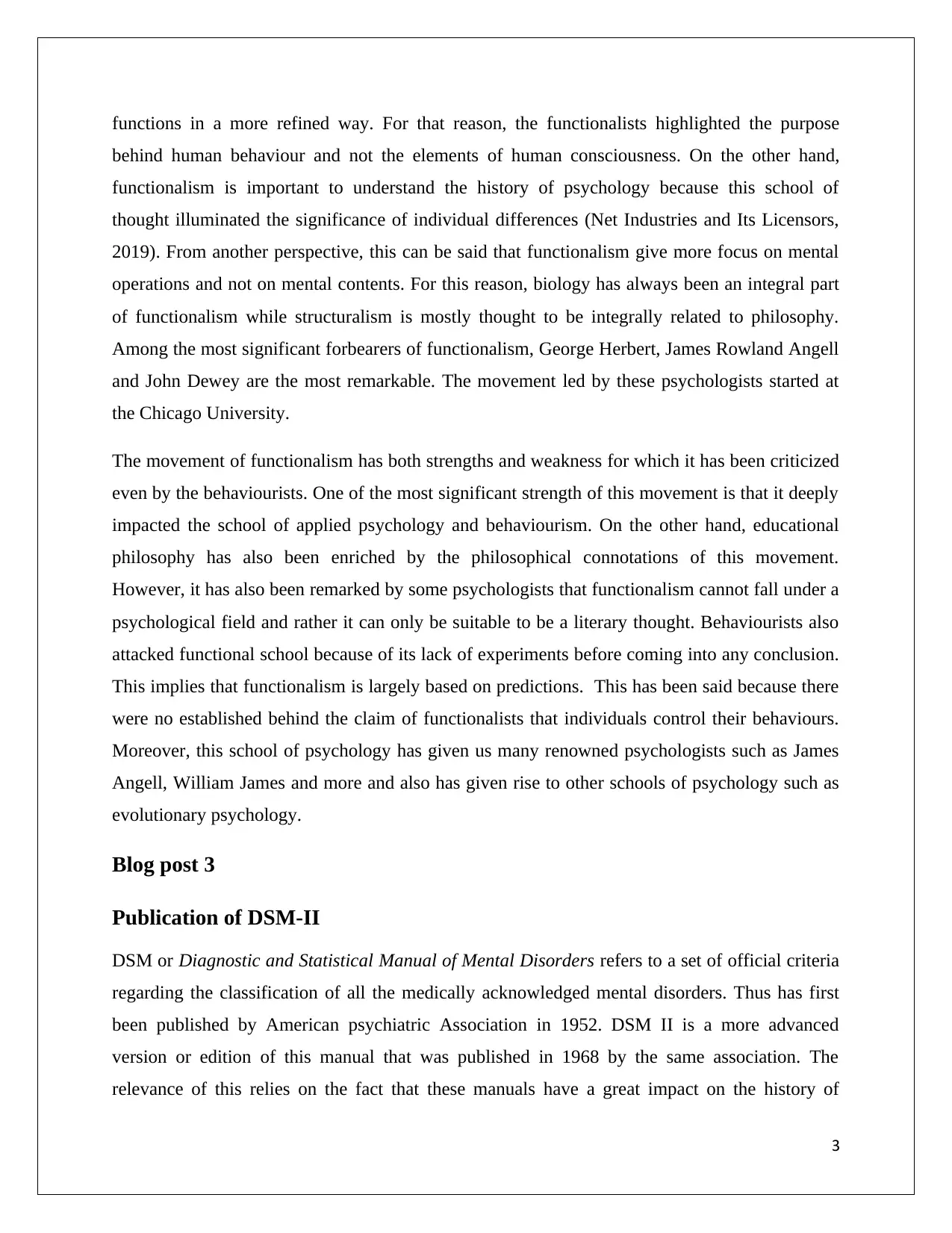
functions in a more refined way. For that reason, the functionalists highlighted the purpose
behind human behaviour and not the elements of human consciousness. On the other hand,
functionalism is important to understand the history of psychology because this school of
thought illuminated the significance of individual differences (Net Industries and Its Licensors,
2019). From another perspective, this can be said that functionalism give more focus on mental
operations and not on mental contents. For this reason, biology has always been an integral part
of functionalism while structuralism is mostly thought to be integrally related to philosophy.
Among the most significant forbearers of functionalism, George Herbert, James Rowland Angell
and John Dewey are the most remarkable. The movement led by these psychologists started at
the Chicago University.
The movement of functionalism has both strengths and weakness for which it has been criticized
even by the behaviourists. One of the most significant strength of this movement is that it deeply
impacted the school of applied psychology and behaviourism. On the other hand, educational
philosophy has also been enriched by the philosophical connotations of this movement.
However, it has also been remarked by some psychologists that functionalism cannot fall under a
psychological field and rather it can only be suitable to be a literary thought. Behaviourists also
attacked functional school because of its lack of experiments before coming into any conclusion.
This implies that functionalism is largely based on predictions. This has been said because there
were no established behind the claim of functionalists that individuals control their behaviours.
Moreover, this school of psychology has given us many renowned psychologists such as James
Angell, William James and more and also has given rise to other schools of psychology such as
evolutionary psychology.
Blog post 3
Publication of DSM-II
DSM or Diagnostic and Statistical Manual of Mental Disorders refers to a set of official criteria
regarding the classification of all the medically acknowledged mental disorders. Thus has first
been published by American psychiatric Association in 1952. DSM II is a more advanced
version or edition of this manual that was published in 1968 by the same association. The
relevance of this relies on the fact that these manuals have a great impact on the history of
3
behind human behaviour and not the elements of human consciousness. On the other hand,
functionalism is important to understand the history of psychology because this school of
thought illuminated the significance of individual differences (Net Industries and Its Licensors,
2019). From another perspective, this can be said that functionalism give more focus on mental
operations and not on mental contents. For this reason, biology has always been an integral part
of functionalism while structuralism is mostly thought to be integrally related to philosophy.
Among the most significant forbearers of functionalism, George Herbert, James Rowland Angell
and John Dewey are the most remarkable. The movement led by these psychologists started at
the Chicago University.
The movement of functionalism has both strengths and weakness for which it has been criticized
even by the behaviourists. One of the most significant strength of this movement is that it deeply
impacted the school of applied psychology and behaviourism. On the other hand, educational
philosophy has also been enriched by the philosophical connotations of this movement.
However, it has also been remarked by some psychologists that functionalism cannot fall under a
psychological field and rather it can only be suitable to be a literary thought. Behaviourists also
attacked functional school because of its lack of experiments before coming into any conclusion.
This implies that functionalism is largely based on predictions. This has been said because there
were no established behind the claim of functionalists that individuals control their behaviours.
Moreover, this school of psychology has given us many renowned psychologists such as James
Angell, William James and more and also has given rise to other schools of psychology such as
evolutionary psychology.
Blog post 3
Publication of DSM-II
DSM or Diagnostic and Statistical Manual of Mental Disorders refers to a set of official criteria
regarding the classification of all the medically acknowledged mental disorders. Thus has first
been published by American psychiatric Association in 1952. DSM II is a more advanced
version or edition of this manual that was published in 1968 by the same association. The
relevance of this relies on the fact that these manuals have a great impact on the history of
3
Paraphrase This Document
Need a fresh take? Get an instant paraphrase of this document with our AI Paraphraser
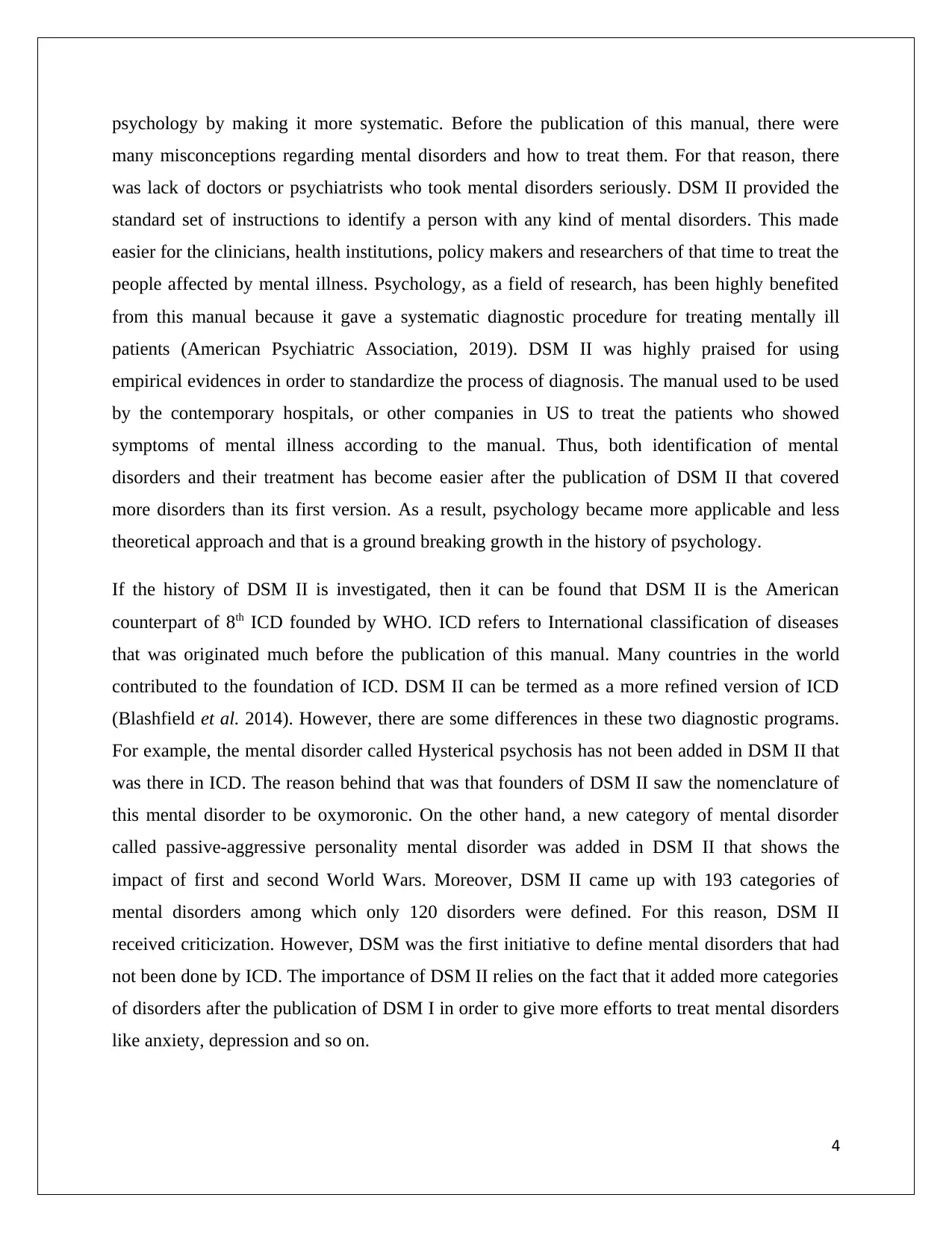
psychology by making it more systematic. Before the publication of this manual, there were
many misconceptions regarding mental disorders and how to treat them. For that reason, there
was lack of doctors or psychiatrists who took mental disorders seriously. DSM II provided the
standard set of instructions to identify a person with any kind of mental disorders. This made
easier for the clinicians, health institutions, policy makers and researchers of that time to treat the
people affected by mental illness. Psychology, as a field of research, has been highly benefited
from this manual because it gave a systematic diagnostic procedure for treating mentally ill
patients (American Psychiatric Association, 2019). DSM II was highly praised for using
empirical evidences in order to standardize the process of diagnosis. The manual used to be used
by the contemporary hospitals, or other companies in US to treat the patients who showed
symptoms of mental illness according to the manual. Thus, both identification of mental
disorders and their treatment has become easier after the publication of DSM II that covered
more disorders than its first version. As a result, psychology became more applicable and less
theoretical approach and that is a ground breaking growth in the history of psychology.
If the history of DSM II is investigated, then it can be found that DSM II is the American
counterpart of 8th ICD founded by WHO. ICD refers to International classification of diseases
that was originated much before the publication of this manual. Many countries in the world
contributed to the foundation of ICD. DSM II can be termed as a more refined version of ICD
(Blashfield et al. 2014). However, there are some differences in these two diagnostic programs.
For example, the mental disorder called Hysterical psychosis has not been added in DSM II that
was there in ICD. The reason behind that was that founders of DSM II saw the nomenclature of
this mental disorder to be oxymoronic. On the other hand, a new category of mental disorder
called passive-aggressive personality mental disorder was added in DSM II that shows the
impact of first and second World Wars. Moreover, DSM II came up with 193 categories of
mental disorders among which only 120 disorders were defined. For this reason, DSM II
received criticization. However, DSM was the first initiative to define mental disorders that had
not been done by ICD. The importance of DSM II relies on the fact that it added more categories
of disorders after the publication of DSM I in order to give more efforts to treat mental disorders
like anxiety, depression and so on.
4
many misconceptions regarding mental disorders and how to treat them. For that reason, there
was lack of doctors or psychiatrists who took mental disorders seriously. DSM II provided the
standard set of instructions to identify a person with any kind of mental disorders. This made
easier for the clinicians, health institutions, policy makers and researchers of that time to treat the
people affected by mental illness. Psychology, as a field of research, has been highly benefited
from this manual because it gave a systematic diagnostic procedure for treating mentally ill
patients (American Psychiatric Association, 2019). DSM II was highly praised for using
empirical evidences in order to standardize the process of diagnosis. The manual used to be used
by the contemporary hospitals, or other companies in US to treat the patients who showed
symptoms of mental illness according to the manual. Thus, both identification of mental
disorders and their treatment has become easier after the publication of DSM II that covered
more disorders than its first version. As a result, psychology became more applicable and less
theoretical approach and that is a ground breaking growth in the history of psychology.
If the history of DSM II is investigated, then it can be found that DSM II is the American
counterpart of 8th ICD founded by WHO. ICD refers to International classification of diseases
that was originated much before the publication of this manual. Many countries in the world
contributed to the foundation of ICD. DSM II can be termed as a more refined version of ICD
(Blashfield et al. 2014). However, there are some differences in these two diagnostic programs.
For example, the mental disorder called Hysterical psychosis has not been added in DSM II that
was there in ICD. The reason behind that was that founders of DSM II saw the nomenclature of
this mental disorder to be oxymoronic. On the other hand, a new category of mental disorder
called passive-aggressive personality mental disorder was added in DSM II that shows the
impact of first and second World Wars. Moreover, DSM II came up with 193 categories of
mental disorders among which only 120 disorders were defined. For this reason, DSM II
received criticization. However, DSM was the first initiative to define mental disorders that had
not been done by ICD. The importance of DSM II relies on the fact that it added more categories
of disorders after the publication of DSM I in order to give more efforts to treat mental disorders
like anxiety, depression and so on.
4
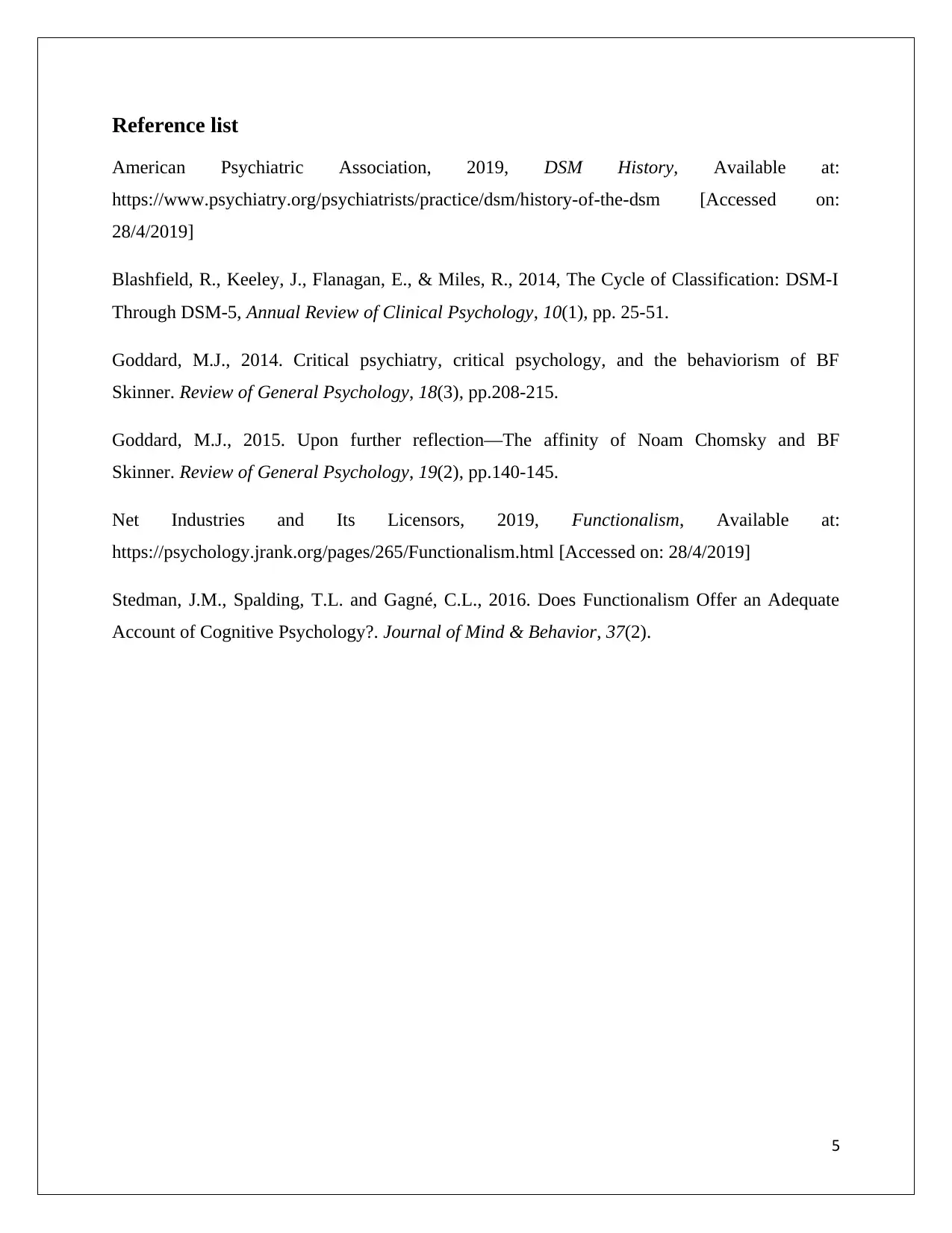
Reference list
American Psychiatric Association, 2019, DSM History, Available at:
https://www.psychiatry.org/psychiatrists/practice/dsm/history-of-the-dsm [Accessed on:
28/4/2019]
Blashfield, R., Keeley, J., Flanagan, E., & Miles, R., 2014, The Cycle of Classification: DSM-I
Through DSM-5, Annual Review of Clinical Psychology, 10(1), pp. 25-51.
Goddard, M.J., 2014. Critical psychiatry, critical psychology, and the behaviorism of BF
Skinner. Review of General Psychology, 18(3), pp.208-215.
Goddard, M.J., 2015. Upon further reflection—The affinity of Noam Chomsky and BF
Skinner. Review of General Psychology, 19(2), pp.140-145.
Net Industries and Its Licensors, 2019, Functionalism, Available at:
https://psychology.jrank.org/pages/265/Functionalism.html [Accessed on: 28/4/2019]
Stedman, J.M., Spalding, T.L. and Gagné, C.L., 2016. Does Functionalism Offer an Adequate
Account of Cognitive Psychology?. Journal of Mind & Behavior, 37(2).
5
American Psychiatric Association, 2019, DSM History, Available at:
https://www.psychiatry.org/psychiatrists/practice/dsm/history-of-the-dsm [Accessed on:
28/4/2019]
Blashfield, R., Keeley, J., Flanagan, E., & Miles, R., 2014, The Cycle of Classification: DSM-I
Through DSM-5, Annual Review of Clinical Psychology, 10(1), pp. 25-51.
Goddard, M.J., 2014. Critical psychiatry, critical psychology, and the behaviorism of BF
Skinner. Review of General Psychology, 18(3), pp.208-215.
Goddard, M.J., 2015. Upon further reflection—The affinity of Noam Chomsky and BF
Skinner. Review of General Psychology, 19(2), pp.140-145.
Net Industries and Its Licensors, 2019, Functionalism, Available at:
https://psychology.jrank.org/pages/265/Functionalism.html [Accessed on: 28/4/2019]
Stedman, J.M., Spalding, T.L. and Gagné, C.L., 2016. Does Functionalism Offer an Adequate
Account of Cognitive Psychology?. Journal of Mind & Behavior, 37(2).
5
⊘ This is a preview!⊘
Do you want full access?
Subscribe today to unlock all pages.

Trusted by 1+ million students worldwide
1 out of 6
Related Documents
Your All-in-One AI-Powered Toolkit for Academic Success.
+13062052269
info@desklib.com
Available 24*7 on WhatsApp / Email
![[object Object]](/_next/static/media/star-bottom.7253800d.svg)
Unlock your academic potential
Copyright © 2020–2026 A2Z Services. All Rights Reserved. Developed and managed by ZUCOL.





